A news team trails a man as he travels into the world of Eden Parish to find his missing sister, where it becomes apparent that this paradise may not be as it seems.A news team trails a man as he travels into the world of Eden Parish to find his missing sister, where it becomes apparent that this paradise may not be as it seems.A news team trails a man as he travels into the world of Eden Parish to find his missing sister, where it becomes apparent that this paradise may not be as it seems.
- Director
- Writer
- Stars
- Awards
- 4 wins & 12 nominations total
Reginald Lashaun Clay
- Robert
- (as Lashaun Clay)
Christian Ojore Mayfield
- Pilot
- (as Christian O'Jore)
- Director
- Writer
- All cast & crew
- Production, box office & more at IMDbPro
Featured reviews
I was born in 83, so anything I know of Jonestown has been gleaned from podcasts, documentaries, or anniversary television broadcasts. Even that is much more than some.
And that's how it works, right? As much as we hate to admit it, as time moves on, everything (and I do mean *everything*) fades from memory. Go ahead and ask a 16 yr old nowadays who Jim Jones or David Koresh were - I bet they'll roll their eyes and assume you're talking about an 80s rock band lead. That fading and moving on of time is exactly why the remake/prequel/sequel/reboot industry is a thing of the Millennial age that never was before.
In order for history (good, bad, or indifferent) to continue to be passed along, the stories have to be retold and reincarnated in ways that are more appealing to those who come after. So maybe The Sacrament doesn't come right out and say, "Hey, we remade Guyana," but I sincerely doubt any of the filmmakers involved thought that viewers of the right age were going to mistake the story for anything else. Another movie that tells a variation of Jonestown without acknowledging it is "The Veil" btw.
As far as found footage films go, this one is high quality cinematography-wise. I thought the casting was actually fairly impressive, and despite knowing exactly where the story was headed, I did find the second half hard to watch; it did give me insight into Jonestown in a way that was truly shocking.
Worth a watch. Won't blow your mind, or bring home an Oscar, but Ti West is always hit or miss with me (mostly miss) and this one wasn't too bad. If you would rather see Jonestown through a less modern, less horror-genre lens, then by all means, go watch the stuff made in the 80s.
And that's how it works, right? As much as we hate to admit it, as time moves on, everything (and I do mean *everything*) fades from memory. Go ahead and ask a 16 yr old nowadays who Jim Jones or David Koresh were - I bet they'll roll their eyes and assume you're talking about an 80s rock band lead. That fading and moving on of time is exactly why the remake/prequel/sequel/reboot industry is a thing of the Millennial age that never was before.
In order for history (good, bad, or indifferent) to continue to be passed along, the stories have to be retold and reincarnated in ways that are more appealing to those who come after. So maybe The Sacrament doesn't come right out and say, "Hey, we remade Guyana," but I sincerely doubt any of the filmmakers involved thought that viewers of the right age were going to mistake the story for anything else. Another movie that tells a variation of Jonestown without acknowledging it is "The Veil" btw.
As far as found footage films go, this one is high quality cinematography-wise. I thought the casting was actually fairly impressive, and despite knowing exactly where the story was headed, I did find the second half hard to watch; it did give me insight into Jonestown in a way that was truly shocking.
Worth a watch. Won't blow your mind, or bring home an Oscar, but Ti West is always hit or miss with me (mostly miss) and this one wasn't too bad. If you would rather see Jonestown through a less modern, less horror-genre lens, then by all means, go watch the stuff made in the 80s.
This is basically a re-telling of the Jonestown Massacre, which, if anyone doesn't know, is a real event that happened in the late 1970's, when a megalomaniac by the name of Jim Jones brought several hundred members of a religious group called the People's Temple to a remote jungle location in Guyana.
After a small cadre of politicians arrived by a small private plane to respond to several requests from disillusioned members of the congregation, there suddenly was a desperate stampede by a number of the group to leave the compound. Jim Jones then ordered the guards to shoot the members who were attempting to leave, and gave the entire crowd each a cup of kool-aid laced with cyanide in a mass suicide.
The event was forgotten for many years, and has been dramatized in this film, which takes the original story and hams it up for the camera, by taking the stance of a "reality" show approach to the filming.
Unfortunately, the experiment fails to generate the sense of reality that the filmmakers were attempting to capture, and the feeling is much more forced rather than coming from a real event. Although it was a reasonably noble attempt to make a notorious situation somehow believable, by it's very nature, it is doomed. It would have been much more believable if the film were just shot as a normal film would be, without the extra layer of a "found footage" project.
Since the camera is always supposed to be running, there are moments in the film in which the actors have to look directly into the lens and explain that the camera is going to keep running "so that there is a record of whatever happens," which completely destroys any sense of the reality of the moment -- the idea of deliberately having a camera in someone's hand in each scene is so unbearably false that the viewer is immediately left wondering why on earth they even thought this technique would help to make the story seem "real." In fact, it does the exact opposite.
The use of the hand-held 'shaky cam' in almost every scene is utterly unmotivated -- in what would be the climax of the movie, the camera is so ridiculously present that it almost seems like SNL decided to take the idea and turn it into one of Andy Samberg's sarcastic short films, because they have used such a heavy-handed approach to the material.
In telling the story of Jonestown, nothing would have been needed other than to have just told the story as it unfolded without the addition of this added layer of "reality" -- and it would have been a much more superior film. This, sadly, destroys any chance of that happening.
The story of the People's Temple deserves better treatment than this, and, given a more experienced filmmaker, would have had a much deeper impact. I regret that we have lost that opportunity now, having seen this approach fail.
After a small cadre of politicians arrived by a small private plane to respond to several requests from disillusioned members of the congregation, there suddenly was a desperate stampede by a number of the group to leave the compound. Jim Jones then ordered the guards to shoot the members who were attempting to leave, and gave the entire crowd each a cup of kool-aid laced with cyanide in a mass suicide.
The event was forgotten for many years, and has been dramatized in this film, which takes the original story and hams it up for the camera, by taking the stance of a "reality" show approach to the filming.
Unfortunately, the experiment fails to generate the sense of reality that the filmmakers were attempting to capture, and the feeling is much more forced rather than coming from a real event. Although it was a reasonably noble attempt to make a notorious situation somehow believable, by it's very nature, it is doomed. It would have been much more believable if the film were just shot as a normal film would be, without the extra layer of a "found footage" project.
Since the camera is always supposed to be running, there are moments in the film in which the actors have to look directly into the lens and explain that the camera is going to keep running "so that there is a record of whatever happens," which completely destroys any sense of the reality of the moment -- the idea of deliberately having a camera in someone's hand in each scene is so unbearably false that the viewer is immediately left wondering why on earth they even thought this technique would help to make the story seem "real." In fact, it does the exact opposite.
The use of the hand-held 'shaky cam' in almost every scene is utterly unmotivated -- in what would be the climax of the movie, the camera is so ridiculously present that it almost seems like SNL decided to take the idea and turn it into one of Andy Samberg's sarcastic short films, because they have used such a heavy-handed approach to the material.
In telling the story of Jonestown, nothing would have been needed other than to have just told the story as it unfolded without the addition of this added layer of "reality" -- and it would have been a much more superior film. This, sadly, destroys any chance of that happening.
The story of the People's Temple deserves better treatment than this, and, given a more experienced filmmaker, would have had a much deeper impact. I regret that we have lost that opportunity now, having seen this approach fail.
Already out there that stands as legitimate information. Try reading "Raven,"try viewing a quality documentary and understanding the historical context from which this "movie" came from. I'm sorry but people really died in this horrible ordeal and it clearly wasn't a film. Sometimes spending 4m on a project is just a bad idea outside giving work to actors and film crews. It's not a mystery that opening weekend seemed to bring in less than $550 USD. This effort would have been better served by the creators simply retelling the original story perhaps from a different view point. I thought it was in poor taste to put up that 167 lives were lost and that only two survived. Try over 900 with no movie stars involved. 3/10 was for how things looked at the outset. Don't pay any money for this.
Most people seem to dislike the "found-footage" genre, though I personal like to see what stories filmmakers can create and develop it as a found-footage (mostly horror). I did like the first 3 installments of "Paranormal Activity," I absolutely loved "Cloverfield," and "The Blair Witch Project" did scare me. Thus, if you found more than one of these repulsive, ignore my review. I will also warn that this is obviously not a movie for everyone. After watching this movie, I can say that I came out very disturbed and mortified, which was Ti West's intentions (I presume). The whole film feels very real, and I did enjoy Gene Jones and Amy Seimitz's terrifyingly surreal acting. Most people will see this movie knowing how it'll end since it's based on the Jonestown massacre (don't look this up if you don't know it!!!), but that doesn't mean there weren't other aspects of the movie that weren't entertaining. For what the movie is about, I was surprised to still be jumping in my seat and breathing heavily at moments of great suspense. My only complaints about the film were some of the choices Ti West chose to move the story (those moments where the audience knows they are doing something very stupid and it feels unrealistic that they would do that to begin with). Some criticism I've heard is that it takes forever to get to the "good" parts. I'm going to argue that that is false criticism unless you are only looking to watch a 95 minute movie filled with terror and suspense. Yes, the first half of the movie doesn't have very much suspense, but there is still a chilling mood creeping up every minute. Plus, the chemistry between the actors is great and entertaining!
What starts out as a promising look into a religious cult, quickly turns into a jumbled mess of incoherent storytelling, baffling motivations, and annoying camera work.
The problem is none of the characters are well rounded or defined beyond the absolute basics (and they do incredibly stupid things throughout the film, especially in the second half). So when things start going bad, it's hard to care. The film seems to want to offer a deep, nuanced look into the world of cults, but West doesn't seem to be able to paint anyone with more than a primary colored brush. Everyone is a caricature ...especially "Father", who is little more than a mouthpiece for religious mumbo jumbo.
The decision to make this found footage becomes the film's biggest flaw, as the extremely limited use of the camera gives every scene a flat incomplete feeling, totally stripping the film of any gravitas or meaning. Found footage has become a lazy, tired cliché in the horror genre and West is no where near talented enough to make it work. West is quickly becoming a hackneyed presence in the world of horror, and it's a mystery why people make such a big deal of him.
And I am wondering where the hell the $4 Million budget went, since the cinematography is bare bones, we're only ever in a single location, and there are no explosions or huge actions scenes. I mean you could've made this for less than a million dollars and it would've been exactly the same movie.
All in all a disappointing film.
The problem is none of the characters are well rounded or defined beyond the absolute basics (and they do incredibly stupid things throughout the film, especially in the second half). So when things start going bad, it's hard to care. The film seems to want to offer a deep, nuanced look into the world of cults, but West doesn't seem to be able to paint anyone with more than a primary colored brush. Everyone is a caricature ...especially "Father", who is little more than a mouthpiece for religious mumbo jumbo.
The decision to make this found footage becomes the film's biggest flaw, as the extremely limited use of the camera gives every scene a flat incomplete feeling, totally stripping the film of any gravitas or meaning. Found footage has become a lazy, tired cliché in the horror genre and West is no where near talented enough to make it work. West is quickly becoming a hackneyed presence in the world of horror, and it's a mystery why people make such a big deal of him.
And I am wondering where the hell the $4 Million budget went, since the cinematography is bare bones, we're only ever in a single location, and there are no explosions or huge actions scenes. I mean you could've made this for less than a million dollars and it would've been exactly the same movie.
All in all a disappointing film.
Found Footage Picks From the Directors of 'V/H/S/Halloween'
Found Footage Picks From the Directors of 'V/H/S/Halloween'
We asked the directors of V/H/S/Halloween to curate a list of some of their favorite found footage films, including some classics of the sub-genre and some deep cuts to add to your Watchlist.
Did you know
- TriviaGene Jones nailed his big interview scene in a single seventeen minute take.
- ConnectionsFeatured in WatchMojo: Top 10 Creepy Cults in Movies (2015)
- SoundtracksHeartbeats
Words and Music by Olof Dreijer (as Olof Bjorn Dreijer) & Karin Dreijer (as Karin Elizabeth Dreijer Andersson)
© Universal - Polygram International Publishing Inc. On behalf of Bert's Songs Ltd. (ASCAP)
Performed by The Knife
Courtesy of Mute & Rabid Records
By arrangement with Bank Robber Music
- How long is The Sacrament?Powered by Alexa
Details
Box office
- Budget
- $4,000,000 (estimated)
- Gross US & Canada
- $9,221
- Opening weekend US & Canada
- $583
- Jun 8, 2014
- Gross worldwide
- $9,221
- Runtime
- 1h 39m(99 min)
- Color
- Sound mix
- Aspect ratio
- 1.85 : 1
Contribute to this page
Suggest an edit or add missing content





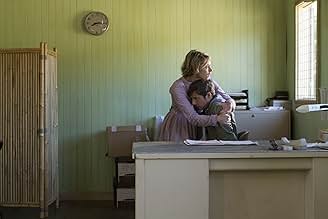
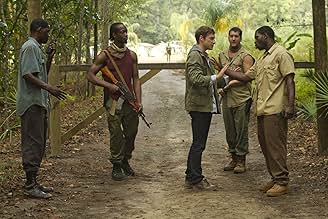
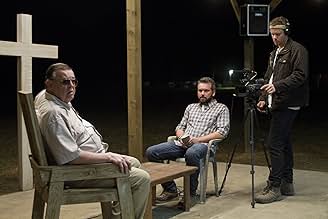
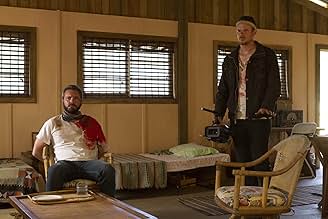
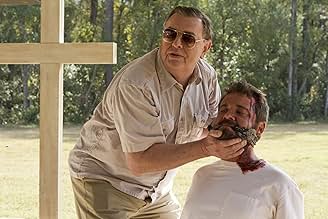






























![Manuela Velasco in [REC] (2007)](https://m.media-amazon.com/images/M/MV5BNTJiYjhkM2YtNjU0MC00MzMwLWE1ODktMGFkZWM3NTk4NDdkXkEyXkFqcGc@._V1_QL75_UX500_CR0)


